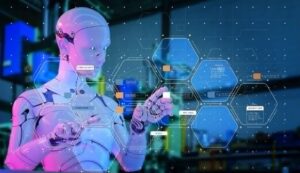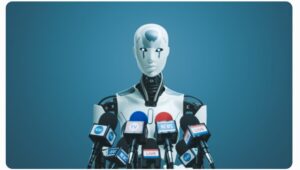Is AI a service or product?
Is AI a service or product?
Artificial Intelligence (AI) has become a transformative force across industries, driving innovations in automation, analytics, and customer engagement. Yet, questions remain: Is AI a service or a product? This distinction is important as businesses look to invest in AI solutions.
Additionally, with AI’s growing presence in customer service, many wonder: Can AI fully replace human customer service agents?
In this blog, we’ll explore the dual identity of AI as both a service and a product, and critically examine its role in customer service, from strengths to limitations.
Is AI a service or product?
Understanding AI – Service or Product?

1.1 What is AI?
AI refers to the simulation of human intelligence in machines that can learn, reason, and perform tasks autonomously. It powers everything from recommendation systems on Netflix to voice assistants like Siri and Alexa.
Through advanced technologies such as machine learning, natural language processing (NLP), and computer vision, AI can analyse data, make predictions, and even mimic human conversation.
1.2 AI as a Product
When AI is packaged into standalone tools or systems, it functions as a product. Businesses and individuals purchase these tools to address specific needs, such as automating workflows, analysing data, or enhancing customer experiences.
Examples of AI as a Product:
- ChatGPT: A conversational AI product capable of answering questions and generating text-based responses.
- Grammarly: AI-powered writing assistance software.
- Roomba: An AI-driven robotic vacuum cleaner.
Such AI products are designed for specific tasks, delivering tangible benefits to end-users without requiring ongoing service dependencies.
Is AI a service or product?
1.3 AI as a Service
AI as a Service (AIaaS) is the provision of AI capabilities through cloud platforms on a subscription or pay-per-use basis. These services offer pre-built algorithms, APIs, and tools that businesses can easily integrate into their operations.
Examples of AIaaS Providers:
- Amazon Web Services (AWS): Offers AI tools like Rekognition for image analysis and Lex for building conversational interfaces.
- Google Cloud AI: Provides NLP, speech-to-text, and translation APIs.
- IBM Watson: Delivers AI solutions for data-driven decision-making and virtual assistants.
AIaaS lowers the barrier to entry for organisations, making advanced AI accessible without significant upfront investment.
1.4 Hybrid Models
Some AI applications defy strict categorisation. For example, a chatbot could be sold as a standalone product or offered as part of a subscription-based AIaaS package. This flexibility allows businesses to choose models that align with their budgets and operational needs.
Can AI Replace Customer Service Agents?
2.1 AI’s Role in Customer Service
AI is already reshaping customer service by automating repetitive tasks, providing instant responses, and analysing customer sentiment. Popular applications include:
- Chatbots: Tools like Zendesk AI Chatbot handle FAQs and simple queries.
- Virtual Assistants: AI-powered systems like Cleo assist customers with financial inquiries.
- Sentiment Analysis: Tools like MonkeyLearn analyse customer feedback to gauge satisfaction.
These systems enhance efficiency and ensure 24/7 availability.
2.2 Advantages of AI in Customer Service
Cost Savings: AI significantly reduces the need for large customer service teams.
Scalability: AI systems can handle multiple queries simultaneously without delays.
Speed: Immediate responses to common questions improve customer satisfaction.
Consistency: Unlike humans, AI provides uniform answers every time.
2.3 Limitations of AI in Customer Service
Despite its strengths, AI has notable limitations:
- Empathy Deficit: AI struggles with emotional intelligence, making it less effective in resolving sensitive or complex issues.
- Contextual Challenges: It often fails to understand cultural nuances, sarcasm, or ambiguous language.
- Dependence on Data: AI systems require extensive training data and regular updates to remain accurate.
- Lack of Adaptability: AI is limited to programmed scenarios, making it inadequate for dynamic or creative problem-solving.
2.4 The Role of Human Agents
While AI excels in efficiency, human agents bring qualities that machines cannot replicate:
- Empathy and Personalisation: Humans can connect emotionally and tailor responses to individual customers.
- Problem-Solving Skills: Human agents can adapt to unforeseen challenges and think outside the box.
- Brand Building: Personal interactions with agents can strengthen brand loyalty.
2.5 The Future of AI and Customer Service
The future likely lies in a hybrid model where AI and humans collaborate. For instance:
- AI handles initial queries or FAQs, reducing agent workload.
- Complex issues are escalated to human agents for personalised solutions.
Emerging technologies like Emotion AI and Generative AI may eventually enable AI to engage more empathetically, but human oversight will remain critical.
Conclusion
AI can be both a service and a product, depending on how it is implemented. It is transforming customer service by automating tasks, improving response times, and reducing costs.
However, it cannot fully replace human agents due to its limitations in empathy, creativity, and adaptability.
Takeaway: Businesses should embrace AI as a tool to enhance, not replace, human customer service. By combining the efficiency of AI with the personal touch of human agents, organisations can provide an optimal customer experience.




















